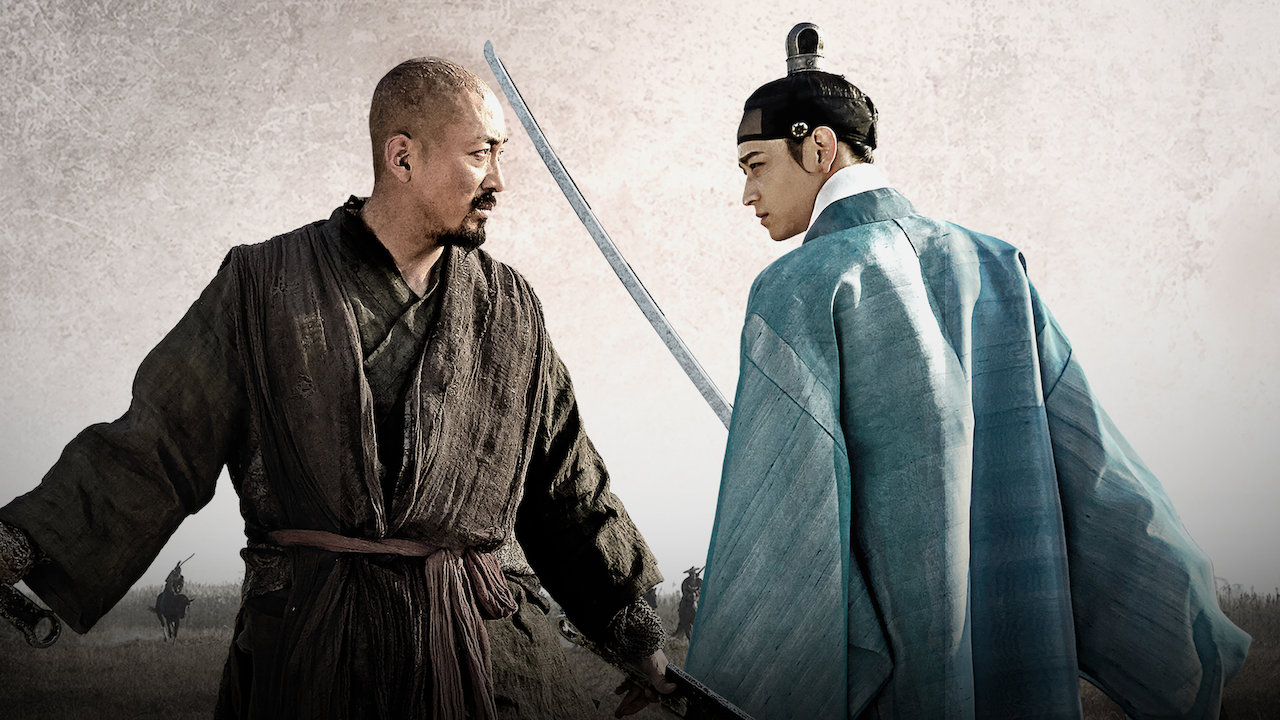By Chlotrudis Independent Film Society
Rating: 2.5 cats
Director: Yoon Jong-bin
Starring: Cho Jin-woong | Gang Dong-won | Ha Jung-woo | Kim Jong-goo | Lee Sung-min | Yoon Ji-hye

Original language title: Kundo: min-ran-eui si-dae
Country: south_korea
Year: 2014
Running time: 137
IMDB: http://www.imdb.com/title/tt2972482/combined
Jason says: “Sometimes, a movie spends so long introducing itself that it barely has time to do anything, which feels like the case for KUNDO: AGE OF THE RAMPANT. I think it’s because this movie wants so badly to be a Western, but while it takes place in the right era, the place isn’t right, and trying to force it means the filmmakers have to explain a lot in a genre that is, at its best, almost instinctive.
“It is 1862, a time of famine and plague in the Joseon kingdom, and instead of helping the people, governor Choi (Kim Jong-goo) is throwing himself a lavish sixtieth birthday party, one about to be crashed by the Chusul Clan of Mount Jiri, an outlaw clan that does a little more than rob the rich and give to the poor, including captain Dae-ho (Lee Sung-min), scholar Lee Tae-gi (Cho Jin-woong), doctor Ma-hyang (Yoon Ji-hye), and ‘The Vicious Monk’ (Lee Kyoung-young). What they don’t foresee is how their actions will result in Jo Yoon (Gang Dong-won), a ruthlessly ambitious bastard son of a former nobleman, rising to power, although Jo’s cruelty gains them a new recruit in butcher Dol Moo Chi (Ha Jung-woo), later known as ‘Dolchi’.
“Director Yoon Jong-bin and co-writer Jun Chul-hong divide the film into five acts that each have their own titles and narration, and while it’s not a complete stop-and-start each time, it slows the pace down; when the viewer is still getting background information late in the game, there’s only so much time for the filmmakers to have things happen against that background. After hitting the ground running with the caper at Choi’s mansion, KUNDO detours into an extended origin story for Yoon that leads into introducing Dolchi, and then following him for a while before catching back up with Yoon, and by the time that’s all done, the team introduced at the start is so far in the background that one wonders why they were given the introduction that they were.
“That might be easier to swallow if the movie wasn’t also so doggedly grim once things get moving. It’s one thing not to screw around with your villain – Jo Yoon is an outright bastard from top to bottom, both murdering hostages in cold blood and scamming illiterate farmers in petty ways that still resonate today, and that’s kind of great – but it’s nice to have a little good cheer to balance that. The Chusul Clan, though, are not exactly cut from the Erroll Flynn cloth as Robin Hood types; they’re all about retribution and kill their share as well, and the comic relief is either mean-spirited or absent. There’s no trouble choosing sides, but that is mostly a function of what a monster Jo Yoon is. Even that gets repetitive (sometimes literally – there are two separate babies standing between him and being his father’s heir).
“At least these driven characters have enjoyably intense performances behind them. Ha Jung-woo may seem to have his face set in a permanent scowl as Dolchi, but he does a nice progression from the wretch he starts out as (butchers, we’re told, are considered the lowest of the low in Joseon society) to where he’s having a brutal sort of fun as part of the clan – beyond the commitment, he seems to dig having some look up to him and others fear him. Gang Dong-won throws himself into playing Jo Yoon as a maniac, practically cackling in some scenes and cold-blooded in others, but keeping the background that forged his ruthlessness always present enough that the audience doesn’t actually need the constant reminders he was born in a brothel. Song Young-chang essays a sort of mild corruption as his father, and while some of Dolchi’s compatriots fade toward the background, others are memorable: Lee Kyoung-young as a no-nonsense monk, Yoon Ji-hye as a healer who is good with a bow, and Cho Jin-woong, sadly underused as the educated man best able to defuse a situation with some humor.
“The action isn’t bad, at least, although it doesn’t really kick into high gear until toward the end, when the audience finally gets to see the duels between Dolchi and Jo Yoon that they’ve been waiting for. These have some nifty fight choreography, especially given the weapons chosen (a pair of oversized butchers’ knives for Dolchi, an elegant sword for Jo Yoon) and how the costuming really emphasizes the theme of the unwashed prole versus the artificially clean plutocrat. That scruffy image and the desert where much of the action takes place calls to mind spaghetti westerns, and the score by Jo Yeong-wook certainly calls that to mind (although third-hand in some cases, as the credits note that some music comes from DJANGO UNCHAINED). The last shot just
makes it perfectly clear.
“There was plenty of darkness in some of those westerns, of course, so arguably KUNDO: AGE OF THE RAMPANTi is just being faithful to those inspirations and the more recent history of brutal Korean revenge pictures. And, let’s face it, striking back at the rich and powerful doesn’t always go that well. But even a dark story needs the occasional spark of excitement, and this one could have done a lot better on that account. 2.5 cats
“Seen 30 August 2014 in Showcase Cinemas de Lux Revere #10 (first- run, DCP)”
